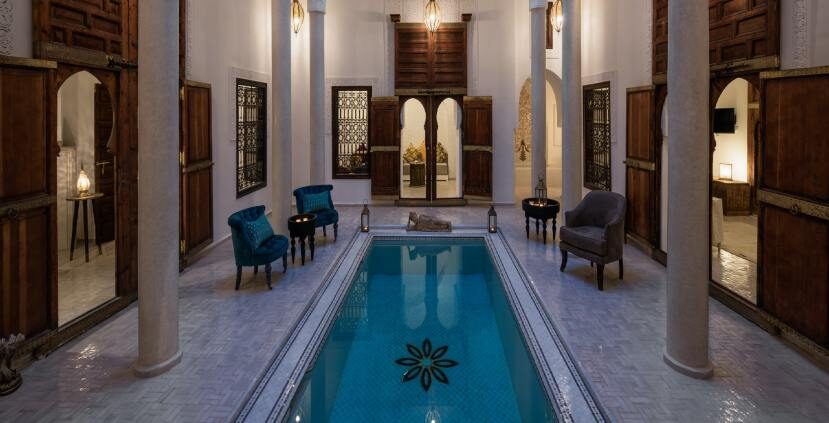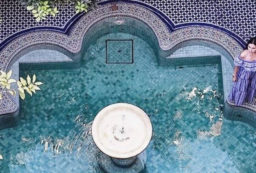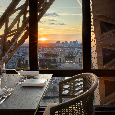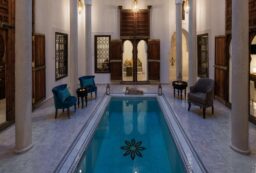
There is a grand vision to Riad Spice, a luxuriously spacious ten-room boutique hotel hidden amongst the labyrinthine ochre derbs of Marrakech’s Médina. The three-storey house, dating from the early 1600s, is both a place for self-indulgence and a chance to experience the vibrant intensity of Moroccan life.
Two stories coalesce to create the vision of Riad Spice. Firstly, there is the story of Mike Wood, who first visited Morocco with his friend Mohammed Essakhi, a chef, around 2000. Falling in love with Marrakech, Mike soon returned with his wife Lucie to buy a holiday home. Over the following decades, Mike and Lucie set-up four riads: Cinnamon, Dar Habiba, Papillon and Star. Then they bought a grand property, in need of extensive renovation at 2, Derb Said Ahansal next to the Ben Youssef Madrasa, close to the Marrakech Museum and just a ten-minute walk from the Jemaa El Fna.

The second story delves back deep into Moroccan history. Over four centuries ago, the Ahansal family were traders riding their laden caravan of camels, through the Spice Routes of the Sahara Desert, following an age-old trade that had existed since at least 2,000 B.C. Literally, the Ahansals were Bedouin, desert dwellers.
The Ahansals settled in Marrakech, becoming successful farmers and respected community leaders. As skilled horsemen, they fired their muskets, their baroud, as part of the spectacular galloping Tabourida Fantasia. The neighbouring Baroudienne Souk is a linguistic remnant of the Ahansal legacy.

"The Riad Spiece is a place for self-indulgence and a chance to experience the vibrant intensity of Moroccan life."
Mike and Lucie, acquired the house in 2017, returning to their favourite craftsmen from the souks to create their vision of the ultimate riad, honouring both the Ahansal’s centuries in Marrakesh and the preceding years in the Sahara. There they would have learnt how to erect tents strong enough to weather the sirocco’s gusts, yet sufficiently compact to be packed away in mere minutes.
The Paradise room, essentially a penthouse with a difference, tops Riad Spice’s third storey, recalling the Ahansals nomadic days. Pleated taupe drapes fall from carved cedar coving and there is a vast bed with 300 thread count Egyptian linens topped by a regal crimson cover. Silver wall-hangings flint and glitter in the sunlight. It is a dreamy romantic room, fit for a sultan, that was designed to almost float, like a magical carpet, above the Red City. The views, away towards the distant Atlas Mountains, are as mystical as they have been for a millennium.

This is a magical place for honeymoons and anniversaries and celebrations, to sit in the secluded private garden, with a pot of mint tea and gaze across a skyline dotted with Mosque towers. A tranquil retreat from frantic haggling Marrakech, a quiet spot to hear the echoing Muezzins’ long, echoing calls to prayer: to watch storks flapping back towards their nests as the setting sun dips.

At Riad Spice, the Wood’s vision looks to both past and present. Behind the craftsman’s chiselled creations, behind the restored grand fire-places, behind cedar wardrobes – there is over two kilometres of wiring for super-fast Wi-fi, mini-fridges, smart televisions and air-conditioning. Nine rooms are named after spices Anise, Cinnamon, Coriander, Ginger, Juniper, Nigella, Paprika, Ras al Hanout and Saffron. Translator’s note: Ras al Hanout is the name that spice merchants gave to their finest “top of the shop” premium blend, so, at Riad Spice it is a secluded suite on the second floor.

At the heart of Marrakech’s souks, Moroccan cuisine is a big draw. The English speaking concierge will book you a place on a half-day cookery course at nearby Riad Star. After the road trip of celebrity chefs Gordon Ramsey, Gino D’Acampo and Fred Siriex, when “three unwise men” called into Riad Star to film their television programme, the cookery school has been busier than ever. Another facet of Arab culture, the Hamman, is celebrated on Riad Star’s rooftop.

"This is a magical place for honeymoons and anniversaries and celebrations, to sit in the secluded private garden, with a pot of mint tea and gaze across a skyline dotted with Mosque towers."
Mike and Lucie appreciate the power of stories. Another of their projects is the Henna Cafe, a charitable project raising funds for local causes. But when lockdown halted progress, Mike and Lucie created the World Storytelling Cafe, a virtual platform where storytellers are invited to broadcast their tales and poetry. As a psychotherapist, Lucie values the transformative power of story to elevate narrators from victim to survivor.

Another strand of the Marrakech story is the tradition of hospitality. Again Mike and Lucie have given it a contemporary twist. Travellers are collected from Marrakech’s airport, just five miles away, then driven until the road becomes a narrow derb. A porter collects guests and their luggage for the final yards of their journey before serving a tagine.

Technology takes the warm welcome further. All guests at the five riads are given a local mobile phone with the Marrakech-Riad app installed, wherever they are in the city, they have their own personal guide to hand. The Ahansals of past centuries may not have understood the technology but, surely, they would have approved of the continuing warmth of Marrakech hospitality?















